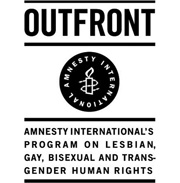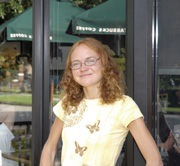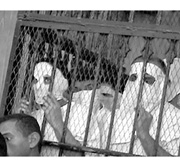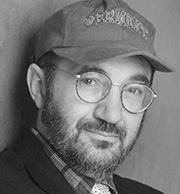Around the World
With the screening of a hard-hitting documentary about oppression internationally, an Amnesty International GLBT-interest group launches in Houston.
 A young woman from Norway is bringing focus in Houston to the very real problem of oppression against GLBT people here and abroad. Kristin Tangvik Magnussen, who is living temporarily in Houston as part of a work-exchange program with her employer, an Oslo-based energy company, is laying the groundwork for a local GLBT interest group affiliated with Amnesty International, the New York-based human-rights organization.
A young woman from Norway is bringing focus in Houston to the very real problem of oppression against GLBT people here and abroad. Kristin Tangvik Magnussen, who is living temporarily in Houston as part of a work-exchange program with her employer, an Oslo-based energy company, is laying the groundwork for a local GLBT interest group affiliated with Amnesty International, the New York-based human-rights organization.
On July 9, Magnussen and Amnesty International will present a screening at the Houston GLBT Community Center of the 2003 documentary Dangerous Living: Coming Out in the Developing World. The film directed by John Scagliotti (director of After Stonewall and founder of the PBS series In the Life ) examines the struggles of gay, lesbian, bisexual, and transgender communities across five continents. A question-and-answer session with Magnussen and representatives of the local Amnesty International chapter will follow the 7 p.m. screening. There is no admission charge, but donations for the community center (3400 Montrose Blvd., Suite 207) will be encouraged.

Also this month, Magnussen is organizing a local display of photographs of GLBT people in Kenya, Tanzania, and Uganda, where life as a gay, lesbian, bisexual, or transgender person is prohibited by national law and can be exceptionally dangerous. The pictures, taken by photographer Mário Firmino and presented at the Montrose Starbucks (3407 Montrose Blvd.), were included in a larger exhibition, Africa Mix, “made as a part of a fundraising campaign in Norway called Queer Solidarity,” Magnussen says. “In 2006, the campaign targeted groups in East Africa.” (More info: www.skeivungdom.no/art/view/266.)
Magnussen points out, “The people in the pictures were putting themselves at risk [by even being photographed]. So they are very brave.”
In America, we can easily take for granted our relative safety and acceptance, compared to the lives of many GLBT people in other parts of the world. As Magnussen points out, though, the price for living openly in some nations can be high indeed. “There are several countries that have the death penalty for open gays and lesbians and transgenders and bisexuals,” she says.

Magnussen returns to her native Norway this month. She hopes that the July 9 screening and the photography exhibition—as well as a first-ever Amnesty International booth at the GLBT Pride Festival last month—inspires others in Houston to pick up the cause of human rights for GLBT people in every country. “We want to encourage queer solidarity,” she says.
_____________________________
International Crisis
The documentary Dangerous Living: Coming Out in the Developing World presents stories of oppression against GLBT people, including the Cairo 52, a group of men arrested, imprisoned, and tortured in Egypt for gathering at a discotheque in 2001. There is no law against homosexuality in Egypt, and the men were charged with committing crimes of debauchery. They were convicted and served three years in prison. The documentary, to be screened on July 9 at the Houston GLBT Community Center, features scenes of the Cairo 52 (see photo) including one

of the convicted men, Ashraf Zanati (see photo), who is interviewed in the film. John Scagliotti (see photo) directed the documentary, which is narrated by the actress and comedian Janeane Garofalo.
_____________________________
Internationally Speaking
OUTFront, the GLBT-focused group of Amnesty International, monitors international human-rights violations of gay, lesbian, bisexual, and transgender people and works to raise public awareness. In a recent phone conversation from his New York office, OUTFront national field organizer Ariel Herrera singled out a few hot spots where life as a queer person can be particularly hazardous to one’s health.
Eastern Europe and Russia. “I think some of the violence we’re seeing”—most recently during Pride month—“is a backlash to LGBT activism around the world.”
Iraq. “We increasingly see the target killings of gay men and transgender women by death squads.”
Iran. “There’s a kind of moral sweep that’s going on right now, primarily enforced by a paramilitary-type groups, to basically enforce a type of public conduct.”
Nepal. “Over the years we’ve seen horrible abuses of metis —for lack of a better translation, transgender women. You also see the resilience of GLBT activists on the ground in that country.”
Honduras. “We see the targeting of LGBT activists, largely by corrupt law enforcement officials.” These violations have included “false arrests, transgender activists being killed, and the ransacking of activists’ offices.”
Caribbean. “This is another one of those hot spots in terms of violence against gay men specifically. We’ve documented mob violence in Jamaica. We’ve worked with activists with JFLAG [the GLBT rights group in Jamaica], who have received death threats and been assaulted.”
United States. “One of our biggest campaigns is to target police brutality against LGBT people.” Amnesty International OUTFront is currently investigating violence against transgender people by New York City police officers.
“People are working on LGBT activism in every part of the world,” Herrera said. “I think that’s pretty amazing.”
More info: www.amnestyusa.org/outfront.










